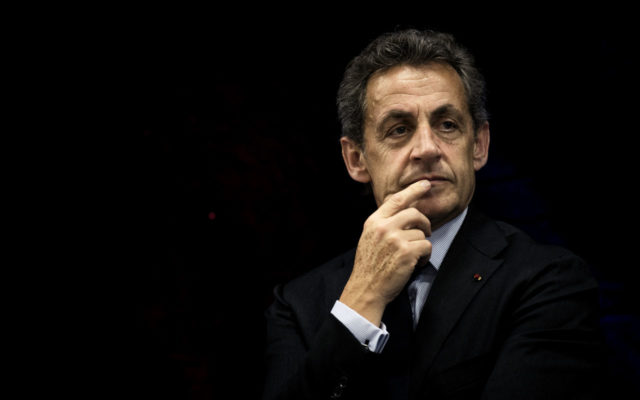By AFP
(FILES) In this file photo taken on May 12, 2016 former French president and president of France’s right-wing Les Republicains (LR) party, Nicolas Sarkozy, listens to a speech, in Jonage, central-eastern France. Former French president Nicolas Sarkozy has been ordered to stand trial for corruption and influence peddling involving a judge, from whom he tried to get information about an investigation, a legal source said on March 29, 2018. / AFP PHOTO / JEFF PACHOUD
A French court on Thursday handed former president Nicolas Sarkozy a one-year prison sentence for illegal financing of his 2012 re-election bid, dealing a fresh blow to the right-winger seven months after he received a jail term for corruption.
Sarkozy, 66, will not serve time behind bars under the terms of Thursday’s verdict, with the court ruling that he could serve it at home by wearing an electronic bracelet.
He was not in court to hear the judge impose the maximum sentence for illegal campaign financing after finding that Sarkozy had “voluntarily neglected to exercise oversight over the spending incurred.”
Sarkozy’s lawyer Thierry Herzog said his client would appeal the conviction.
Sarkozy spent nearly twice the legal limit of 22.5 million euros ($26 million) on his failed bid for a second term in office.
The case is one of several arising from a string of investigations into Sarkozy’s affairs, which have largely failed to dent his popularity among conservative voters.
In March, he became France’s first postwar president to be sentenced to jail relating to his attempts to secure favours from a judge in return for the promise of a plum retirement job.
He has accused the judiciary, with which he crossed swords during his time as president between 2007 and 2012, of hounding him.
“I never betrayed the trust of the French people,” he told the TF1 channel in March.
Fake invoices
Sarkozy pulled out all the stops in 2012 as he sought to fend off his Socialist rival Francois Hollande for a second term.
A series of lavish US-style election rallies caused his costs to spiral, with the final bill coming to at least 42.8 million euros.
The public relations firm Bygmalion, hired to organise the events, set up a system of fake invoices to mask the real cost of the events.
While the investigation failed to prove Sarkozy was aware of the fraud, the court ruled that he had “undeniably” profited from it.
At his five-week trial in May and June, the prosecution portrayed him as having a “cavalier” attitude to the public money available to candidates during campaigning.
Sarkozy argued he had been too busy running the country to closely scrutinise the accounts.
His Union for a Popular Movement party, since renamed the Republicans, picked up the tab for most of the excess.
Thirteen other people, including Sarkozy’s former campaign manager, several Bygmalion executives and a handful of former Republicans directors, were also tried in the case.
They received jail terms of up to three and a half years in prison, with part of the sentences suspended.
Corruption case The case failed to garner much interest among the public, seen as less sensational than his earlier corruption trial.
Sarkozy received a three-year jail term for corruption and influence peddling in that case, two years of which were suspended. He has also appealed that verdict.
In that case too he will likely avoid prison even if he loses his appeal, with the judge saying she would consider letting him serve his sentence under electronic surveillance at home.
Before Sarkozy, the only French leader to be convicted in a criminal trial was his predecessor Jacques Chirac, who received a two-year suspended sentence in 2011 for corruption over a fake jobs scandal relating to his time as Paris mayor.
Sarkozy has also been charged over allegations that he received millions of euros for his 2007 election campaign from the late Libyan dictator Moamer Kadhafi.
And in January, prosecutors opened a probe into alleged influence-peddling involving his activities as a consultant in Russia.
He brushed aside his legal woes in 2016 and attempted to stage a political comeback.
But he failed to win the Republican nomination for president, losing to his former prime minister Francois Fillon, who campaigned as a cleaner pair of hands.
Fillon was tipped to win the election but crashed out in the first round over revelations his wife was paid nearly a million euros for a suspected fake job as a parliamentary assistant.
Fillon and his wife were later convicted of fraud.

